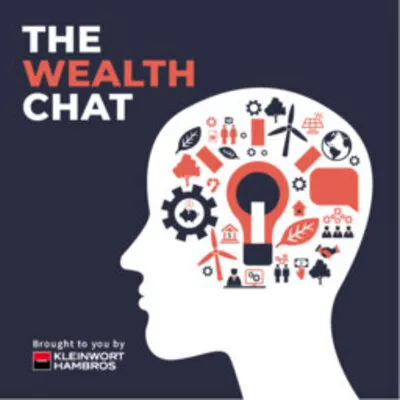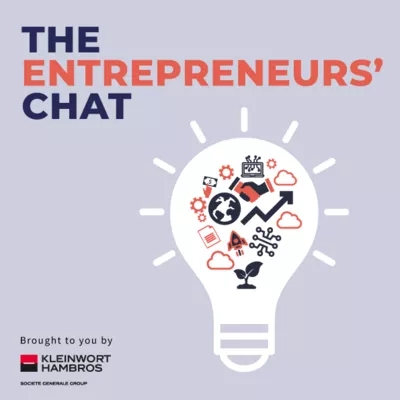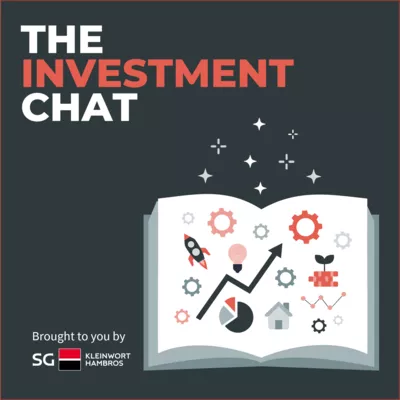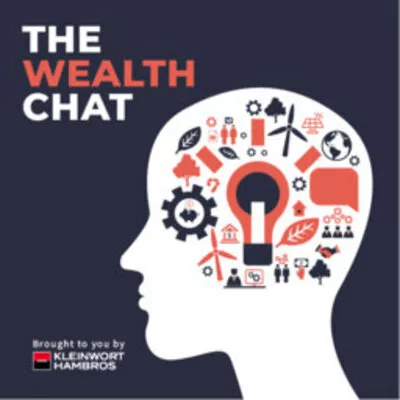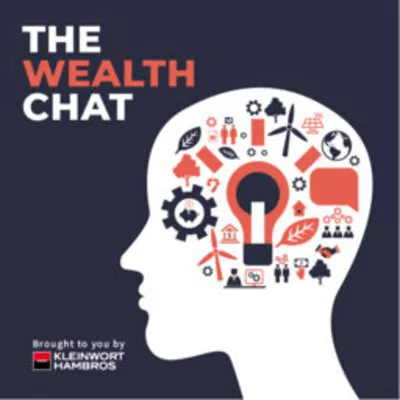
FREE PAYMENTS FOREVER, with Super Payments
Transcript
The Entrepreneurs' Chat
Super Payments
00:00:05
James Hurley: Hello and welcome to The Entrepreneurs' Chat. A podcast brought to you by SG Kleinwort Hambros. I'm James Hurley, assistant business editor at The Times. And I'm your host for this series. From startup to sale and everything in between, the course of growing a business never goes smoothly. And this is the podcast where we go behind the scenes, exploring the highs and lows that come with scaling a company.
Today I'm talking to Samir Desai, the founder and chief executive of SuperPayments.
00:00:31
Samir Desai: There were businesses like Square and PayPal, and they were starting to encroach on the loans business that we had. And I was trying to work out why they were making so much money. I had this assumption that money was free. I thought when you pay someone in a shop £ 10, £ 20 pounds, that's what someone gets. And then I just started going into it and looking at how the money moved, and where it all went. But it just felt crazy to me. It just didn't make sense. And it just blew my mind that there's trillions of dollars of market cap in payments.
00:01:01
James Hurley: I first met Samir more than 10 years ago, over a spot of fish and chips. Samir was telling me about his idea to cut out banks, and link up ordinary people up with small companies wanting to borrow money. That idea became Funding Circle, a now listed company that's arranged about £ 15 billion worth of credit to 135, 000 businesses since 2010.
Samir now runs a startup called SuperPayments, a Fintech which plans to offer zero cost online payments for businesses, and more rewarding shopping for consumers. It's a promise that if fulfilled, might have an even bigger impact than Funding Circle. SuperPayments has already raised £ 22.5 million in one of the largest ever pre- seed funding rounds in Europe, and is backed by the same group of investors behind the likes of Facebook, Spotify, Stripe, and Monzo. Samir's here to tell us all about a new way to pay and shop.
Why don't we begin with Super then? You became a pretty wealthy man when Funding Circle floated in 2018. Why did you want to start again from scratch?
00:02:00
Samir Desai: So I think when I did the Funding Circle journey, and still involved in it, it was an incredibly rewarding experience. Both from the impact we had, but also from a personal perspective. Felt like I learned an incredible amount. I got to travel to all these different countries where we launched. I got to get to know people in government, in business. Institutional investors, retail investors. And eventually take the business public. And now be able to be a board member, and help in a different way. So the experience was incredibly rewarding. And actually, I feel that there's nothing really like it. And what you realize when you start these businesses... I was also in a privileged position, because I got to... Funding Circle support a lot of entrepreneurs. A lot of the businesses we supported were owner managed. You talk to them, they were all entrepreneurs, and their passion is their business.
The highs in these startup businesses or these businesses are just so high. The lows are really, really low. There's nothing like those as well, but the highs make it worth it. And you become almost, addicted is the wrong word, but you want to do it again. So when I stepped back, I'd had other ideas. But I expected to take quite a long time off, actually. Thought I'm so exhausted. I've loved it. It's been great, but... And then because I spent more time on this very particular idea of Super Payments, I just ended up falling in love with it. And unfortunately, you can't really choose these ideas that you fall in love with. And I just wanted to do it.
And there's this great Steve Jobs quote which is, the journey's the reward. And when I did it the first time, you're so in it, you don't really appreciate how good things are. Whereas I think what's been nice this time is I have managed to actually, even though the lows are still as low as they, maybe even worse, you can actually appreciate it a little bit more. You can almost step back a little bit, and understand how rewarding it is. It was more just to be able to do something that you fall in love with as an idea, and I felt like it was a really big problem-
00:04:13
James Hurley: And what's it like being back in a I guess, a startup versus... Funding Circle by the time you left, was a company with real scale, wasn't it? Hundreds of staff, and shiny offices and everything. And you are now talking to me in a WeWork in Victoria, which is emblematic of the difference and going back to the start again. How have you found that transition?
00:04:32
Samir Desai: I mean, I wouldn't say it was all smooth sailing. Because when I left Funding Circle, well when I stepped back as CEO, and I still feel very involved, as I said. But I'm not running it day to day, and I try and give them a lot of space. And I'm there more as an advisor now, if I'm honest about it. But I think when I left, it was 1100 people. So it was big. Lots of different geographies, lots of different offices. Your real job as an executive of a business like that is to set the vision, set the culture. Really, you're only supposed to make a few big decisions a day really. Not even a day, maybe in a week or a month. And I always used to find it quite weird that as the CEO or founder of these businesses, you get a disproportionate amount of the credit.
So it's like oh, look how great this is because Samir did this. When actually there's a thousand people doing stuff. But then the flip's true as well, that you get disproportionate amounts of blame. And people are like oh, why did you do that? And why is the company doing that? And you're like well actually, it's a company. It's not just me doing some things. But I've always liked being quite hands- on. I like getting into the detail, I like getting close to customers. And I miss that. When you're a public company CEO, you spend a lot of time with investors. You spend a lot of time in external staff. A lot of government relations, things like that. Things that are less important when you're a startup. Not to say that I didn't like that stuff. I mean I'm glad I got the t- shirt, and enjoyed it while I did it. But I think it's just very different.
So the first few weeks were quite an adjustment. Because I was like, okay. I've got this idea, and people are willing to give me money to do it. And I thought, okay. That's great. But then you're like, God. You have to set up a bank account, and you have to do all these things again. And there's no PA, there's no organizational infrastructure. Because again, (inaudible) back to the Funding Circle stuff, it's really about decision, about strategy. You're not really... I don't know. It sounds bad. You're not really doing that much, really. You are doing a lot in ways, but you're not really. Whereas in this thing, you have to really get your hands dirty straight away. So for the first bit it was like oh, God. This is a bit of a shock. And then you start to enjoy it actually. It was like... Because the other thing that's weird is when you set up a bank account, you set it up and it's complete. And it's done. And you can tick it off your list, and you feel great. Like, that's great. I did that.
Whereas the decisions and stuff you do as a CEO in a bigger company, it's more nebulous. You can't really point to, I did this one thing. You probably have more influence and stuff like that. But it was an adjustment. And it's been interesting. Because there's lots of people who've come to work with us now at Super Payments, who have been in larger jobs. And you can actually see it takes them a week or two, or three weeks to really adjust. And some people don't actually get there, and it's not for them. So in a weird way, it made me feel a bit better watching other people struggle with the first adjustment. It's a very, very different experience, but it's really nice to get back to being very, very close to the product and the customers. And that's incredibly energizing.
00:07:41
James Hurley: And you alluded to the fact that of course, Funding Circle wasn't all plain sailing, despite having a very big impact on the SME credit market. What kind of lessons have you taken from that experience, that you want to inform how you go about building Super Payments?
00:07:56
Samir Desai: I went into the office yesterday to meet some people actually, and I was just looking back. I was like, God. There's just so many people. It's so big. Because I'm so now used to, we have a tiny little office. We can fit 20 people in it. But there's 40 in the company, so we actually can't all fit in the office on the days when we come in, and we're all spread out. And it was just really nice actually to just go and see it all and think oh, God. I was involved in building this thing. It's pretty cool. There's a lot of things I thought we did right at Funding Circle. The culture was great, it was consistently one of the best companies to work for in the UK. We were very open and transparent about things. We tried to generally move very, very fast. And we were a mission- driven company.
We generally care about our customers, about helping small businesses. And what's been nice is when you're a founder, if you can set the right mission and culture and values, a lot of that, it no longer is tied in one or three people as we were when we started it. It becomes something that's actually part of the organization. And that's what made me quite proud actually, going back. You don't always feel like that, because you're always in it. And you don't really have a chance to step back and see it. But there's other stuff though. I've invested a lot more earlier in the technology. And look, that's by virtue of, could we have done that last time? We couldn't, because we were... We were three 26 year olds. We had a little office above a waffle shop. We didn't really have anything.
And we'd never built a tech business before. We just had this idea. So we outsourced a lot of the tech. And actually, you never fully fix legacy tech like that. Our tech is incredible at Funding Circle, but I really wanted to make sure I built it in a very specific way this time, which would allow us to move even faster. Which we've done. And that took us a long time to get to at Funding Circle. You had to really invest a crazy amount to do that. I've massively increased the pace even more than we were doing last time. Because what you realize is, you just don't know the stuff until you get it into the market. Customers will tell you lots of things in research. As I've also realized, everyone will tell you it's a good idea because they don't want to really offend you. But you don't know until you actually get products into market.
You test, you learn. I think there's a great Reid Hoffman thing which is, you should always be embarrassed by your product, or your first release. And I think the thing I'm most proud of at Super Payments so far is our pace of testing, our pace of releasing is incredible. It's almost, maybe it's even too fast. Which I'd never thought I'd actually say. And then I suppose the only other last one is just around, now I've got a bigger appreciation for when you take businesses public, and the timing of that. Because people said to me oh, you've got to really think it through carefully. And I thought, I'm thinking it through carefully. But actually, you only do a public listing once. Maybe you do it more times if businesses go private and back public, or whatever. But there's a lot... You really need to make sure that all the different small elements of it are right.
And I probably spent a bit more time on that kind of stuff, on timing, knowing what I know now. But beyond that, as I said, there's a lot of stuff I'm quite proud of and I thought we did very well. And there's a lot of people who used to work at Funding... Not many have come directly, but a lot of people that used to work for me have come back to work again, because I thought we had a great team and we had a great culture and stuff. There's definitely things you can always improve on.
00:11:38
James Hurley: Really interesting what you were saying about the flotation. On a simple level, do you think that just means waiting a little bit longer? And would you have waited for the business to be showing more profitability I suppose, before you did it in retrospect?
00:11:50
Samir Desai: Yeah. I mean I think in the UK market, it's better to be profitable when you take these businesses public. And I think that opens the universe of investors. Obviously I don't regret when we did. We did what we did within the circumstances that were there, and it was a very difficult period to list the business. And I think there were only two IPOs that year, or something crazy. But I think we did a good job of that. I thought we talked to people, I thought we presented the business in the right way. But I think... I'd say the preparation was more... So it's an interesting psychological thing for a company and a startup to go public, which is quite different to a normal company. And what I mean by that is as a startup, you control a lot of things. Especially as an entrepreneur, you have a lot of control.
You control when you raise money most of the time. You control the price you take. And then the price is the price. And then it stays, and you don't really worry about those kinds of things. And your team doesn't have to worry about that kind of stuff. I suppose what I found was obviously when you go public, you don't control something like the share price. And therefore, there are parts of the narrative that get taken away from you and your ability to communicate. And I often used to wonder... I'd tell people, look. Actually, I think the business is in great shape. And actually, we're doing really well at times when the shares were going down and stuff. And I always wondered if people just thought oh, I just don't believe this guy. Do you know what I mean? Because there's an external thing that you don't control there, that can affect people. Where you end up going, which took me a bit longer than most is you just realize you can't control it actually.
A lot of the time it's irrational, even though everyone says markets are efficient. You can't control the share price, you can't control that. But what you can control is the business. And you focus completely on growing the business, making it profitable. Making it do the things that you want to do. And once you understand that, it's quite liberating. But it's quite a transition I think. Especially as an entrepreneur, because you feel, you take it too personally when people write things. Or when things... If it goes up and down. And it's weird. I talk to lots of CEOs, experienced CEOs. And I'd be like oh, what's your advice and stuff? And how do you think about it? And they're like oh, I don't look at the share price. And then I'd see them. And I'd go to the toilet or something at lunch, and they'd be there, checking their share price.
So I was like, I don't know if anyone really practices what they preach on this stuff. But I felt I got quite good at it by the end. It's just a big step. And it's very different to what comes before. And you're used as an entrepreneur, especially in these textiles, you're told oh, it's going to be really different in this phase. And a lot of the time, I don't find it that different actually. You scale to a different size, you get another geography. It does change, but the public shift is a very big shift. And I think that's the only lesson I would take, is understanding that. But naturally, you have to take these businesses public at some point. It's just the nature of them, and it's an interesting experience.
00:14:53
James Hurley: Really fascinating on that. And so with Super Payments, as you were saying a little bit earlier on, this is founded on the idea, isn't it, I suppose that the payments industry is a little bit broken? And is maybe taking charges that are perhaps at an unfair level. Talk me through the model. It's almost a no win, no fee for online payments to some extent, isn't it?
00:15:13
Samir Desai: Yeah. So I've been thinking about this for years and years. And as I said, I didn't leave Funding Circle because of this. But it was one of these things that it'd been bugging me for a long time. And so years ago, I went and started looking at these payment companies. Because there were businesses like Square and PayPal, and they were starting to encroach on the loans business that we had. And I was trying to work out why they were making so much money. And naively, I'd focused completely on... I understood what we were doing very, very clearly. Lending, and platform and marketplace. But I had this assumption that money was free. I thought when you pay someone in a shop, £ 10, £20, that's what someone gets. And I just assumed that, that's how other payment methods worked, and people made money in other ways.
I mean, it sounds ridiculous in a way. And then I just started going into it and looking at how the money moved, and where it all went. And it just made no sense to me. And these companies were extracting huge margins. And it felt to me like an accident of history. So when money moved onto cards, the original card was a Bank of America card, which eventually became Visa. But they started putting a tax on it. So they put a tax on money through cards every time you pay the card. And that didn't matter so much When cards were little. Then they started to get bigger and bigger. And then when cards moved onto the internet, you had businesses like PayPal, Stripe, all these different businesses ultimately put more tax on it. Such that there's these tax on tax on tax on money. And these fees range anywhere between 1% and 7% depending on the method, the geography.
But it just felt crazy to me. It just didn't make sense. And as I just went deeper and deeper into it, it just blew my mind that there's trillions of dollars of market cap in payments. So many companies doing this, and yet everyone has exactly the same model. Which is I'm going to take a micro clip of every payment, and that's my thing. And then I might give you some extra services. So to me as an entrepreneur, I'm looking at it going, I think this is stupid. But then lots of people said to me oh, merchants don't care. No one cares. They're happy to pay the fees. And that was just this whole intellectual exercise. I just played around with it in my head. And I was also convinced that no one is going to change customer behavior, unless there was something in it.
So why do you and I, even though I care because I like small businesses. But you like small businesses as well, given all the stuff you've done. But most people don't care if it's free for a merchant or not. And we'll just do whatever's fast, or easy. Or whatever's rewarding. But actually the entire interchange system and reward system, basically what happens is everyone pays the banks. And then the banks decide who to give rewards to, which tends to be wealthier people who don't even need rewards really. But what if the merchants, if you made payments free, if the merchants were willing to give some of that or all of it or more to a customer, can you create a different ecosystem where both sides are better off? And then you're in shops with merchants, and small merchants are always like, can you pay with cash? Please pay in cash.
I mean you go into a taxi, they'll practically assault you to try and get you to pay with cash. So I was like this notion that all these payments people tell me that the merchants don't care, they're just happy to pay it, it just didn't seem to be right with me. So anyway, I left Funding Circle and I was taking some time off. And was just I'm playing around, and starting to get bored. And then I thought, screw it. I'm actually just going to go and do a load of research, really understand this proposition. And do all the stuff that I should. And I'm also going to go... Because the second time around, you do have some privileges. I knew a lot of quite senior payment people. And I said, okay. I'm going to go talk to them. I'm going to talk to people who are at Square, and I'm going to talk to people at Worldpay and all these places. And they can explain to me why what I'm thinking is completely bonkers.
So I talked to loads of merchants. And lo and behold they're like, we hate these fees. This is crazy. They were pretty much all willing to give something to the customer. Different variations. So either they'd give money off if it was one of purchases, or they'd give a reward effectively that you could re- spend at their store. So almost like a interoperable store card model. And then I started talking to these people, all these experts. And I said, look, I think payments are stupid. And I think the way it works is stupid. And I went through this idea. And every single one said, we think it's stupid as well. And I'm like, God. These people who've actually been in the industry for years and years, even they think it's stupid. And not even just that, they were like oh, if you raise money, we'll invest.
I was like, okay. This is a good sign. Because they're not even just telling me... Because sometimes people just say oh, it's a good idea. And like I said, they don't want to be offensive. And then the final thing that really did it for me was I came across this business, Target RedCard. So Target is obviously one of the biggest retailers in the world. It's got a hundred billion of sales. And they created a card a long time ago, that didn't run on Visa MasterCard. And they gave customers 5% off every time they paid. And they had a credit version and a debit version. And on the credit version, they did it as effectively, like a marketplace like Funding Circle was, where banks would effectively provide the credit. And they moved 20% of their sales to 20 billion a year onto this card. And I was like, wow. Okay. So this one retailer, now granted it's one of the biggest retailers in the world, so that makes a difference.
But being a naive entrepreneur, you think you can still do it. I thought well, this one retailer has moved 20 billion a year onto this card. This is a card you can only use at Target stores. They built their own terminals, they did the whole thing. And so then pulling it all together, I was like well, imagine if this isn't a card. It could be an app now, because you don't need cards to do this. The new rails like open banking, they are cheap enough... They're not free, but they're so cheap now that you can offer the service for free. It's cheaper for Super Payments to do a payment today, than it is for Chat GPT to run a query that they do. So it completely makes sense to make the whole thing free. And imagine if this was interoperable. So it's not just one thing that you can use in one retailer, but it's something you can use at loads of different retailers.
The retailer is better off, because they're getting the free payments. The customer's better off, because they're getting way higher rewards than they're ever going to get on any other card. And in fact, most customers don't even get offered rewards. The utility, the payment method is way higher. And every party is better off in this chain.
Sorry, that was a really long explanation. But that was basically the whole genesis. And that was the point where I was like, okay. I've just got to try and build this thing now, and see if it can work. But the biggest question though is, how can you do this? Why are you doing this? Why is no one else doing it? But I genuinely think it's got the potential to be absolutely ginormous, and really make a huge impact.
00:21:59
James Hurley: And how are the old guard reacting to this? Because you're not actually the first person that I've spoken to that thinks Visa or MasterCard and that system is I suppose, a bit of a ripoff, some people might say. Certainly expensive. And quite outmoded maybe, is the fairest way of putting it.
Do you think that system is doomed basically?
00:22:16
Samir Desai: No. I mean look, when I started Funding Circle as you remember, we were like, we're going to kill the banks. And they're not going to exist anymore. And I think you grow wise the fact that... Funding Circle is the largest online small business loan provider in the UK and US. No one else comes close for online. And the more that stuff goes online, the more that Funding Circle's going to just get bigger and bigger and bigger. So I'm very excited about all the stuff that company's doing at the moment. But that doesn't mean that banks don't exist, and people aren't going to go and take bank loans. Of course they're going to do that. But do I believe that this should be and can be more than 20% of the market, given what target we're able to achieve? You see some geographies like Brazil, India where more than 50% of payments now are being done through these non Visa MasterCard rails.
Do I believe that it can get to that kind of level scale? Yeah. I think it should. I honestly think that the biggest hurdle we have is to get merchants and customers to try this now for the first time. But once you try it... Why would you pay more as a customer, when you could pay less effectively? And why as a merchant, do you not want this on your checkout or in your shop as another payment method?
It's a no- brainer. It's an incredibly powerful network effect. I'm a student of network effect businesses. That's what Funding Circle is. It's a network effect in the sense that everyone has a card, and everyone has a terminal. But it's also a network effect in the sense that they're bribing the whole system. They bribe all the banks, they bribe some customers. Bribe's a loaded word. They're not obviously doing bribes in the bad sense of the word. Everything's legal. But it's an incredibly powerful thing to break. So the only way... And I've watched people try and break it, and I studied this. There's been things that have tried to do what I'm doing, but without the rewards element. And I think to me, that's the only way you break this thing. It has to be better for everyone. It can't just be like another payment method that's cheaper for someone.
00:24:13
James Hurley: So Funding Circle started as a peer- to- peer lending business, linking up ordinary consumers with small business borrowers. It's evolved into something quite different, and it's more about institutions lending money to small businesses. And indeed, there isn't really much of a broader peer- to- peer market left anymore. Something that you guys had actually pioneered. Why do you think that happened? Why didn't peer- to- peer itself work out?
00:24:36
Samir Desai: I mean I think on some levels, peer- to- peer was incredibly successful. And I think... If I look at my own Funding Circle account, I was investor number three. Obviously James and Andy were one and two. I earn 7% a year, for 12 years. I mean, it was crazy. I don't think I've ever had an investment that good. And if you actually look at the average that people have earned on the whole platform at Funding Circle, it's 5.2%. It's hundreds of millions of pounds, people have actually earned through this product. There were a couple of issues. So one was, it got to a level of scale where there were about probably 150,000 people doing it in the UK. And then a lot more in China. And then the US was probably, actually not that different to the UK. So obviously I think a lot of people really liked it, and liked it as a product. But it ended up, it sounds bad, but it was a niche in the sense of financial services, which is much larger.
And what you generally found was then we started to get a lot of institutions coming to us who were pension funds, insurers. And ultimately, all the money's retail anyway. So it felt like actually the way retail really wanted to access the product was via intermediaries that could do more diligence or control it. I think the second big problem was there were some of these, in every geography, there were these bad operators. People did lose money in China especially. Because of that, it did dent the confidence in... I'm not going to name the ones in the UK. But it definitely dented the confidence that meant it couldn't quite go beyond this size. And it was... Look, in many ways... What I like about business, I like doing very disruptive business models that don't run on current rails. And that's why we're building Super Payments. It doesn't go on the current rails.
Funding Circle, it doesn't go through the current rails. It's not lending via a bank or... It dis- intermediates. It directly connects to customers. And I do find a lot of innovation in Fintech doesn't necessarily, it builds on existing existing rails, as opposed to tries to radically redo the rails. And I think this was one of those types of business model. And in many ways, it was very successful. And it got to a very large level of scale, but I think it just never quite managed to push beyond that. And obviously when there were a few scandals, the regulator environment changed. And I just think all those things together meant that most of the large players ended up exiting. And in a weird way, there was too much demand from institutions. And there continues to be on the other side of the equation. Would I have loved it to be bigger? Yeah. But I don't think there's any investment product that's delivered that kind of consistency or level of return over such a long period of time as what we did.
00:27:25
James Hurley: Do you think it might return in some form?
00:27:27
Samir Desai: I got sent decks for people that want to do it again. I don't know. I thought that there might be a way of doing it with crypto. And I looked at some of those things actually in quite a lot of detail. But then I think the crypto version of it still needs another regulatory settlement. And what's to say it doesn't just end up in the same place? So another way of looking at it is, look at these bank failures at the moment. What do you do on your deposits above 85, 000 if you're a corporate or a retail investor, or anyone? You are lending to your bank. And your bank as we saw with Silicon Valley, a bank can go bust in 24 hours. I'm not trying to... Look, I think the banking system's very resilient. I don't think there's any issues or whatever. But that was one thing that I always thought curtailed the growth of peer- to- peer lending a bit.
It was the increase in the insured deposit limit in UK banks meant that everyone just, I'm insured up to that level. But really above that level, you are lending to bank. But you are a claimant. You are an unsecured lender. Imagine if there was insurance of £ 2000, would everyone want to do peer- to- peer lending then? Yeah. Because you've got the direct loan contract, you are spreading it. You're spreading the risk. It's actually quite attractive, relative to an unsecured loan to a bank, which you don't understand. But I do think... That's obviously not going to happen. I think it probably goes the other way.
00:28:46
James Hurley: And Funding Circle had an interesting time during the pandemic, didn't it? Arguably, at least from the outside, had quite a good pandemic I think, in terms of providing a lot of the emergency loans to small businesses.
What did that look like from the inside of the company?
00:29:00
Samir Desai: Well, I mean it was another one of those incredibly scary times at first. Because being a small business loan provider in the middle of a pandemic, where most small businesses had to close wasn't exactly the best place to be at that exact moment in time. But what was amazing about what we had was we have an automated loan system that could distribute loans at incredible scale directly to small businesses. And credit to the governments in the UK and US. Because in Germany, Netherlands, they didn't do this kind of stuff. They didn't let Fintechs participate. But in the US and UK Fintechs were allowed to be part of the solution. And honestly, that was the most proud I've actually been in Funding Circle in all the... Because we set up the business in 2008 after the global financial crisis, to provide an alternative way for small businesses to access funds.
Would I have loved peer- to-peer to be the overall thing? A big part of what the solution was in covid? Yeah. But ultimately it was about, let's help small businesses. And it was so amazing to be given that chance to actually do it. And I think Funding Circle was I think something like 20%, I can't remember the numbers now. 20%, 30% of all of the CBILS loans, which are the ones where you actually had to lend. You actually had to do underwriting. You weren't just giving people 100% guaranteed loan. You're actually having to do specialist credit underwriting. I think we were the third- biggest loan provider. We were bigger than two of the massive banks. And it was great in a way, because that was exactly why we set up the business. It was to make a difference, actually help. And if you look at the loan performance of the loans, it's pretty much better than what we actually told the government we would do.
And that was partly the reason I actually decided in the end to step back was, I just felt like it was a full circle then. Excuse the pun. But we actually set it up to be this alternative. We proved it was this alternative. And business was very profitable at that point, and I just felt it was a good time to actually step back then. It was scary, but it was incredibly rewarding. And I remember actually... The other thing that I found was amazing was just how much the government officials cared as well. So we had British Business Bank in the UK, and it was-
00:31:19
James Hurley: Small business administration.
00:31:20
Samir Desai: Yeah. SBA. And with both of them, because we were working quite closely, I sent some recordings of the first borrowers we were able to help. These are ones, a bank was taking too long, or they couldn't get the loan or whatever. And then we provided it. And just, we were going through a difficult time as a business during the pandemic, because of the nature of what we are. But if you think about it, if you're a small business, I mean you must've been terrified (inaudible) . And that was the general sense we got. So the joy just from listening to these people, or how happy they were when they actually got their stuff, when we were able to share that with some of these government agencies.
Because, I don't think these guys get enough credit for what they... These guys are working every weekend, late into the night. The British Business Bank is, I don't know. At the time it was like 400, 500 people. It's tiny compared to... In the Small Business Loan Administration in the US, there's thousands of people. But it was just quite rewarding first of all, to see how much impact it could make. And just to generally help these people. But also even to just see how much public servants cared about this stuff, which was something I hadn't necessarily seen ever before actually. I mean you deal with government, you don't really see how much they actually care. So in the end, I thought we were able to do a lot of good and we helped a lot. But at the time it was, I don't know how it was for you guys, but it was pretty scary for a lot of people.
00:32:47
James Hurley: And you've raised venture capital for this business, and also of course raised venture capital for Funding Circle. It's an interesting time for that industry, in the context of the tech correction. And of course, so recently what's happened with Silicon Valley Bank as well. Have you found it a more difficult environment to raise in? Are you noticing a different outlook from VCs at all?
00:33:06
Samir Desai: It's a bit easier to raise the second time you do these things. And then secondly, our idea is so gigantic, it's exactly the kind of thing venture capital investors should be doing. I mean if they don't want to invest in businesses like Super Payments or something, don't know what they're doing all day. There were lots of people that told me that it's stupid. There are a lot of people that said this is quite exciting, we'd like to invest. And then there were people saying well I don't even know if it's going to work, but I trust you to give it a go. I think the market environment has definitely changed. It's been interesting, because we haven't raised money... At Funding Circle, we didn't raise money privately since 2016. And I feel like that's when the market just went a bit Looney Tunes. There were too many people in it, there was too much money.
I think everyone, even the VCs would admit, it got a bit ahead of itself. But compared to when I started Funding Circle in 2009 with James and Andy, I mean there were three or four VCs in London. The American companies, they're... You try and do a call with them, there's no Zoom or anything. And they're like well, come and meet us in Silicon Valley. And we're like, we're not even paying ourselves. We're at McDonald's every day, to save money. I mean, we can't get on a flight. And luckily Index were willing to take a chance on us in 2010/ 11. And then people, as we started to grow the ecosystems, and we got more people. And then eventually we went to America, so we could actually talk to American VCs. If you compare it to now, I mean there are so many venture... There's so much more money, first of all. The funds that these investors have are way bigger than they were. Just one of these people's funds is bigger than all the funds combined previously.
They all have bigger funds, there's a lot more of them. And I think a lot of the US investors have actually realized that Europe isn't this backwater, and we can produce entrepreneurs as well. So actually, is it less crazy than it was in 2020 or '21, which I didn't really know, but I was observing from afar? It seems like it. That's what people tell me. But is it a million times better than it was in 2009, 2010? Yeah. I mean, I feel privileged to be building businesses in this kind of environment now. Because it's like, if you get the traction, there is money and more people willing to do it. And I think it's like, there's so much technological change at the moment. I mean you see the artificial intelligence stuff, and the infrastructure as well. So even building this business this time, the tools you can use, even the people you can talk to who've built businesses already in payments or other things, the entire ecosystem is so much stronger. I think it's a really good time to build these businesses, to be honest.
00:35:58
James Hurley: You mentioned your co- founders there, James Meekings and Andrew Mullinger. Am I right in saying this time you are a sole founder? And if so, what's that like? Do you feel any more pressure going at it alone this time?
00:36:10
Samir Desai: Well, I mean we did talk about it. I mean they're big investors in the business, so that was nice. Because they obviously didn't hate my guts after all the time we spent together. And we did talk about it. But I think... So Andy stepped back in 2016, and I think James in 2019. So by the end, I'd got used to just being fully in charge. Do you know what I mean? A bit less consultative. And then when I went and talked to VCs, I was able to get the money. So then I just pressed on. I mean, do I miss working with them? Yeah. They're amazing. We were all friends as well, which made it even more special.
I mean the other thing we did talk about as well was, we went through that experience. It was the rollercoaster I describe. Low's that are so low. Company nearly goes bankrupt, because you can't... If a round isn't coming together, you need to pay people. Can you make payroll every month?
It's traumatic, but then it's super exciting as well. And then we're like well, we've finished that entire experience. And we still were really good friends. And do you really want to put that at risk a second time? I don't know. I don't really want to put it at risk, if I'm honest about it. Because when you argue, you argue. It's like a marriage in ways. I definitely miss some of it. But on the flip side, there's a lot of people who I used to work with at Funding Circle, that have come to do this now. The way I think about it, they're like co- founders. Because I've worked with them before, and I try and treat everyone that way anyway. I don't feel like I'm doing it alone by any means. I actually feel like it's got a lot of team and friends with me, who believe in what we're doing. I obviously miss working with them particularly, because they're really good friends of mine.
00:37:59
James Hurley: You mentioned highs and lows in the business there. What would you say was the most extreme example of both? So the lowest low, and the highest high that you had in Funding Circle? And were there any lessons from those?
00:38:12
Samir Desai: Oh. I mean, so many. I always remember 2015 as a particularly good year. I just felt like... Now actually when I was looking at some of my notes from that year, it didn't feel like that at the time. But now when I look back on it, it was a particularly... Just a lot of things came together. We were growing really fast in the US. UK was... Everything we did just seemed to work. Got a CBE. And then I just remember 2016, the year after just being really, really hard. Because the Lending Club, which is a parallel business similar to us... We have a similar name. I mean it was really annoying, because we didn't actually come up with the name in a similar way. But people used to think about it in a similar... And we didn't see them and say oh, we're going to come up with this name.
But the founder of that business got fired, which is bad. And then the whole industry, which was marketplace lending, went through a very difficult period. And at the same time, I remember the Brexit vote happened. That created a period where a lot of investors, particularly on the institutional side, didn't really want to either invest in equity of UK businesses or buy loans. Because people are like, well we just... It's just such a big thing. And it's just so...
If you're a big insurer or a big pension fund and you're buying loans from a new thing and then people just ask you oh, well there's Brexit going on, it's just easier not to have the conversation. I saw that a lot with American investors. I remember that year being very, very hard. And we were very loss making at the time, so I had to make sure I raised more money to keep the... And actually then, we had a great 2017. So these things are always ups and downs. But I mean the real lows were... I mean the lowest of the low was in the really early days, where I just remember the first two weeks of the platform, every day things just broke. It just didn't work.
And I remember we'd just work till two in the morning every day just fixing things basically, so that customers wouldn't notice in the morning. And not many people did notice. But things just broke. And I remember at the end of two weeks, and it was probably the closest I ever came to giving up was then. And we still didn't give up. But I was like, God. I just can't do this anymore. And it's like, every day I come in... I go to sleep at two in the morning, I wake up at... And we were all feeling a bit like... And then magically things just started to work one day, for no real reason. It didn't really make sense. We fixed enough bugs. And then it's like trying to raise money. There were different times where if you're raising money in the really early days, it's not like you have... In the later stages of business, you have runway. And you try and raise money when you've got six, 12 months left, because just in case it takes longer.
Whereas in the earlier days, you can't do that. You just have to raise money when you need money. And you need money. And if an investor takes a bit too long or they want to do a bit more diligence, which again, in 2010, 2011, 2012, venture capital diligence, there was weeks of accounting diligence. There were all sorts of diligence, which I think doesn't seem to happen as much nowadays. But it was a different environment. And there was definitely one round where we were a few weeks from running out of money, and that was particularly scary. Because people work for you, and they've got mortgages and they've got kids. And it's just not a nice position to be in. But those are definitely... The biggest lows and the biggest highs definitely come in the earlier days, which is partly an excitement of going back to that. But as I said, it doesn't make the lows any less low, doing it the second time. Which I was hoping they would be a bit less low, but then unfortunately there are not.
00:41:59
James Hurley: Really interesting. And thanks so much for being so open about your experiences, Samir. Final question is, you already had one success as an entrepreneur with Funding Circle. Can you just tell us what success looks like for you in Super? Where do you want to get to with the business? How do you define success?
00:42:15
Samir Desai: Well, I think it's... If we can make a meaningful chunk in this payment market, if we can make this dent and we have a business... Because, I've always been obsessed with these business models that make everyone better off. And that was what was so beautiful about peer-to-peer lending is that retail investors are better off, business is better off. Everyone is better off. And that is exactly what Super Payments is. It's exactly the same concept, but on a much bigger scale if I'm honest about it. The small business lending market is 300, 400 billion, which is gigantic. It's absolutely gigantic, but the payments market is in the trillions. And also the trillions recycle every year, whereas there's a certain amount of loans in the system. We were able to grow that a bit, take share a bit. But ultimately, and I think we'll take much more share over the coming years, I think the scale of this one is just mind- boggling to be honest. And the impact it can have.
And so my hope is obviously that we can, not just in the UK, but I'd like to take it to lots of other countries, we can really genuinely create this self- sustaining alternative network that everyone is better off through using. And if we can, then we are providing choice, we're providing alternatives. Because for a long time I thought oh, 1% to 7% is (inaudible) . But actually, most small businesses or most businesses operate on profit margins of about 5% to 10%. So imagine if you give... You're not talking about 1% or 5% then, you're talking about 50%, 75% increases in what they can actually keep. If that's redistributed back to consumers and businesses, just feels really powerful. I think we'd like to really make a big impact. But what I've learned with these things is there's so many things outside your control, all we can do is work really hard, iterate. Listen to our customers. Try and build products and services that they love. And if we achieve that, then I'm hoping it turns into a very big business as well.
00:44:15
James Hurley: Well thank you so much for joining us, Samir. We certainly wish you the best of luck with it. Thank you.
00:44:18
Samir Desai: Thanks for having me.
00:44:21
James Hurley: Samir, huge thanks for your time and for those honest reflections on the Funding Circle journey and the ups and do
Ask us your questions
Contact usLatest podcasts
